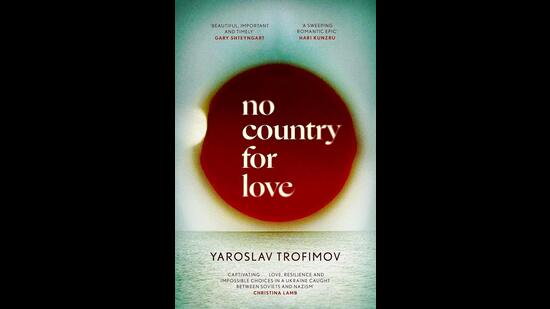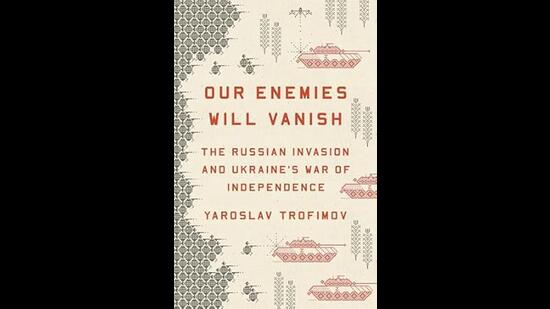Yaroslav Trofimov: “I’m a Soviet melting pot”
Journalism honed my narrative skills for writing about Ukraine's history and conflict, blending fact with character depth in my novels.
How did your training as a journalist help you write Our Enemies Will Vanish: The Russian Invasion and Ukraine’s War of Independence, and the novel, No Country for Love

Paying attention to detail, and the ability to construct a narrative based on facts helped me a lot when I became an author. My non-fiction is an extension of my reportage. My novel is historical fiction, so I did a lot of research to make it as authentic as possible. I travelled, talked to people, and went through archives. As a journalist, you learn to be concise, to say a lot in a limited space. That can be an impediment; your writing can seem telegraphic. I had to find middle ground — express what was required without being verbose.
Journalism tends to focus on the external, observable aspects of reality whereas fiction digs into the inner worlds of characters. Journalism is supposed to be objective, and fiction celebrates subjectivity. What skills did you learn while writing the novel?
When I moved from journalism to narrative non-fiction, for example, my book The Siege of Mecca: The Forgotten Uprising in Islam’s Holiest Shrine and the Birth of Al Qaeda (2007), I had to unlearn a lot of the shorthand that journalists tend to use. And then, going from narrative non-fiction to fiction, I had to expand my aperture a bit more. In fact, when I wrote the first draft of my novel — which is based mostly on my maternal grandmother’s life — I had a conversation with my agent who said, “Well, you really have to decide. Is it a biography or a novel?” Because the inner logic of the two genres is different. I was more inclined towards a work of fiction, and that needed character development. Reality is messy, and it doesn’t necessarily follow the logic of a narrative. When I was writing the book about Mecca, I found myself wishing I could just straighten out the narrative because it was so messy. But you cannot do that with a non-fiction book. Thankfully, you can with fiction.

Tell us about your grandmother, and what it was like to be her grandson.
It was great to be her grandson. My grandmother was a teacher of literature. She had a huge influence on me, especially with my reading. I chose to write about her life because it had many twists and turns. Her story is very dramatic, and actually quite representative of the lives of people in Ukraine at the time.
In the 1930s, 1940s and 1950s, Ukraine was the deadliest place on earth. In 1930, there was this massive man-made famine created by the regime in Moscow that killed millions of Ukrainians. The intellectual elite were executed in the camps. Then came the war, the destruction of Kyiv and other cities by the Nazis, and the Holocaust in which millions more were killed. After the war, when the rest of Europe was rebuilding, there was the Ukrainian insurgency until the mid-1950s.
To survive in those circumstances was very difficult and it involved a lot of courage and skill. It involved moral compromises too. People had to make choices and sacrifices that they really didn’t want to make. They did that for the sake of their children and their loved ones. This is the sort of historical trauma that everyone in Ukraine carries with them because we are all descendants of people who survived that. People didn’t want to talk much about this because there was a lot of shame attached to what people had to do to survive.
In which parts of Ukraine have you spent most of your time?
I was born in Kyiv. As a child, I lived in Kyiv and Odessa. But the novel starts in Kharkiv, which is where my grandmother spent her youth. It is the second largest city in the country, and it is in the east. It was the capital of Ukraine in the early Soviet period when the Ukrainian Soviet Socialist Republic was created. It was the heart of intellectual life. It was and remains on the front lines of the war with Russia for the past three years. But while I was researching No Country for Love, I travelled throughout Ukraine.
You began writing the novel while you were based in Kabul, working for The Wall Street Journal as their bureau chief in Afghanistan and Pakistan. What was that like?
Yes, I started writing in Kabul in 2014. We had a war to cover in Afghanistan, so I could not go to Ukraine to cover the first Russian invasion when everything began. Russia annexed Crimea and fomented the war in the Donbas region in the east. I was shocked at how little Ukraine was understood by the media and the commentariat because Russia had very successfully suppressed Ukraine’s history, identity and culture.
Very few of the Ukrainian writers who were executed by Russia in the 1930s had their works available in English, so they were wiped out from history. Most of what people knew about Ukraine was through the eyes of the colonizer, not through Ukrainian voices. Even Russians who did not necessarily support Vladimir Putin or the Russian invasion brought with them certain biases. They were taught to misread Ukrainian history through the Russian prism.
I thought that it was very important to tell the very complicated story of Ukraine, which is a multi-ethnic, multicultural society. The grandmother whose life my novel is based on was Jewish. I also had a Catholic grandmother, an Orthodox Christian grandfather, and another grandfather who I think was Muslim. I am a mix of everything. I am a Soviet melting pot.
Coming back to the book, the writing began in Kabul in 2014, but I had a lot of research to do, so I finished and submitted it in 2021 just before the full-scale invasion of Ukraine began. It was very eerie because the book has scenes of destruction of Kyiv during the war. All of a sudden, a month later, I found myself in Kyiv, seeing very similar scenes of bombardment, artillery and shelling. The Russian troops were on the edge of the capital of Ukraine.
Let’s talk about Our Enemies Will Vanish. What led you to write this book?
The publisher came to me and they felt that people needed a book that explained the war and this miracle of a country like Ukraine beating back an onslaught by a nuclear superpower like Russia all by itself in the first months of the war. Ukraine was given three days to survive, and now we are entering the fourth year of the war. I had this unique blend of being a war correspondent for a major American newspaper and also being from Ukraine with insights into the society and the culture and the ability to explain the history of the place with nuance. I was really trying to be like the lens of a camera, where I was just bringing myself to the front lines and letting local people speak so that readers would get a sense of what it was to be there. In a way, it was like a road trip through the first year of the war.
One does not see a strong Ukrainian presence at literature festivals. Do you think that your books might change the way people from other countries view Ukraine?
Well, I certainly hope so. The whole idea is to have more Ukrainian voices. One does not see a significant Ukrainian presence in bookshops either, because of the tragic history of Ukrainian literature. Many writers were executed in the 1930s, 1960s and 1970s.
I was reading a book called I Am Transforming… A Diary of Occupation, put together by the Ukrainian writer Victoria Amelina. She found a manuscript by another Ukrainian author Volodymyr Vakulenko-K. He had buried his diary in his own garden when he was arrested and executed by the Russians in 2022. She started writing a book about him, and reflecting on the sorry state of Ukrainian writers who do not really have a long life expectancy. She herself was killed by a Russian missile strike on a restaurant in the city of Kramatorsk in 2023.
For the Russian colonial venture, it is important to destroy Ukrainian voices and Ukrainian culture and not just take over Ukrainian territory. If you listen to Putin, he says that Ukraine is an artificial construct and should not really live as an independent nation under the sun.

While writing about violence and war, how do you take care of your mental health?
Writing helps. The more you put words on paper, the easier it is to understand what you feel. It is not always tragic. Sometimes, there are hopeful stories. Not all wars last forever. I was in Syria recently. The bloody period in Syrian history seems to have ended. That said, journalists writing about war are also humans and have emotions. We cannot detach ourselves from what we write about because we are not automatons. When you write about a war, it is not like writing about a commercial deal between two sides. As a professional, you are objective but there are things that are right and things that are wrong. Killing a child is wrong. There can be no equivalence between the two sides here.
What are your thoughts on India’s response to Russia’s invasion of Ukraine?
India has suffered tremendously from colonialism. Historically, India has had a relationship with the Soviet Union that stood by India’s side in some periods of history. I think people in India are failing to realise that what’s happening in Ukraine now is the biggest colonial war of the 21st century, where the goal is naked aggression. One country is trying to gobble up another and annihilate its independent existence. Many Ukrainians are perplexed that Indians actually don’t see this colonial aspect of the war and are falling for the Russian rhetoric in which Putin presents himself as the leader of the global anti-colonial movement while begin the instigator of a colonial war that has killed hundreds of thousands of people.
Chintan Girish Modi is a journalist, educator and literary critic. He is @chintanwriting on Instagram and X.






